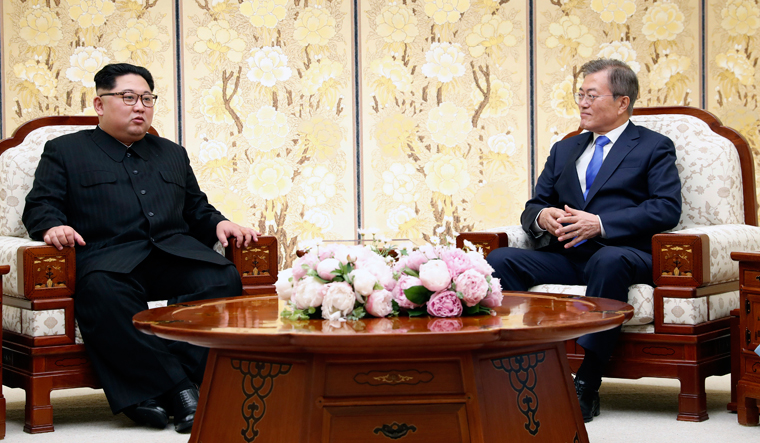North Korea threatened to cut off all communication channels with its rival South Korea, escalating pressure on the latter for failing to stop civilian activists from floating anti-Pyongyang leaflets across the border. According to news agency Associated Press, the North's Korean Central News Agency said it will be the first step in the complete shutdown of all contact with the South. KNCA says all cross-border communication lines will be cut off at Tuesday noon.
"The South Korean authorities connived at the hostile acts against [North Korea] by the riff-raff, while trying to dodge heavy responsibility with nasty excuses," KCNA said. In recent days, North Korea has increasingly expressed its anger over the leafleting by threatening to permanently shut down a liaison office with South Korea and a jointly run Kaesong Industrial Complex, as well as nullify a 2018 inter-Korean tension-reduction agreement.
Technically, North and South Korea are still at war; the 1953 Armistice Agreement between the two countries spells out a ceasefire, not an end to the Korean War. The Korean Peninsula is one of the most militarised regions in the world.
The North Korean threats came amid a prolonged deadlock in its broader nuclear diplomacy with the United States, which has subsequently led to the straining of inter-Korean ties.
South Korea has no immediate response to the North Korean announcement. But, it had recently said it would push for new legal steps to ban activists from launching leaflets in an attempt to save faltering ties with North Korea. But the North has countered that the South Korean response lacks sincerity.
Korean propaganda campaign
The balloon transfer of leaflets has often been a bitter point of contention between the North and the South. In recent years, North Korean defectors and South Korean activists have floated huge balloons carrying leaflets criticising North Korean leader Kim Jong Un over his nuclear ambitions and abysmal human rights record. The North, which bristles at any outside attempt to undermine the Kim leadership, has often delivered a furious response to the South Korean government.
Apart from leaflets criticising North Korean leadership, media reports over the years have catalogued items like pen drives and delicacies like choco-pies, Bibles and Christian religious materials (Christian religious foundations in the prosperous South Korea are one of the biggest detractors of the communist dictatorship). The balloons are often helium-filled and targeted towards the North Korean civilian populace, but it is unclear as to how many reach their destination.
Leaflets and balloons have historical connotations in the Korean Peninsula. In the early days, both the South and North sponsored such propaganda campaigns en masse, but the state involvement reduced over the years as tension reduction agreements were signed (there are examples of the North using such leaflets to threaten war or criticise the South as a "US pawn"). North Korea has, in the past, warned civilians against picking up the packages, warning it could be "poisoned"; in some other cases, they have intercepted the couriers.
These "balloon wars" have often put South Korea in a tough position, as the North has repeatedly threatened to break off diplomatic enagement with the South over such activities. The South has has typically let activists launch such balloons, citing their rights to exercise freedom of speech, but it sometimes sent police officers to stop them from floating leaflets in times of tensions with North Korea.
According to a report by the Institute of Policy Studies (IPS), in 2013, police broke up one attempt at Imjingak to send over gas-filled balloons outfitted with 2,00,000 leaflets. "But the government hasn’t invoked all the laws that it could to prevent the launches. The administration wanted to keep open lines of engagement with North Korea, but it also doesn’t want to appear unresponsive to human rights issues or overly aggressive toward its anti-North Korean constituency," according to the report.
-Inputs from PTI via AP


